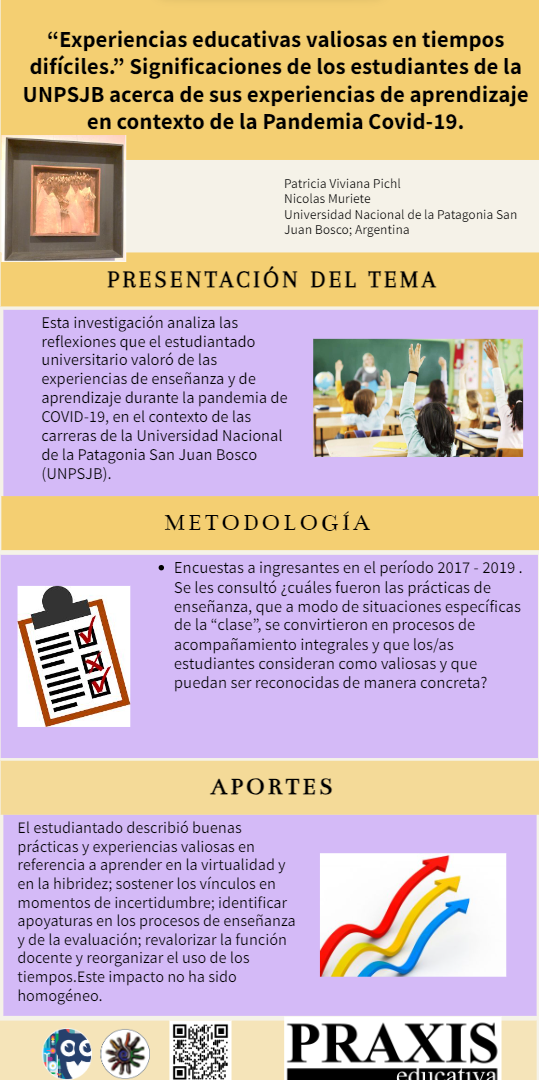Valuable Educational Experiences in Difficult Times: Meanings of UNPSJB Students Regarding Their Learning Experiences in the Context of the Covid-19 Pandemic
DOI:
https://doi.org/10.19137/praxiseducativa-2023-270303Keywords:
students; valuable experiences; university; learning; pandemicAbstract
This research examines the reflections that university students valued regarding teaching and learning experiences during the Covid-19 Pandemic in the context of the degree programs at the National University of Patagonia San Juan Bosco (UNPSJB). The research team specifically asked, "What were the teaching practices that, as specific 'classroom' situations turned into comprehensive support processes, and which students perceive as valuable and can be concretely recognized?" To address this, the authors worked with a category they termed "valuable experiences" as a way to explain which practices students considered significant in that context, both in terms of pedagogical approaches and social-emotional support practices.
Downloads
References
Aguirre, J. y De Laurentis, C. (2016). La buena enseñanza de los docentes universitarios desde la perspectiva de los estudiantes: combinación de formación profesional y valores morales. Revista Entramados- Educación y Sociedad, 3(9), 143-153.
Alvares Rojo, V., García Jimenez, E. y Gil Flores, J. (1999). Características de la docencia mejor evaluada por los alumnos en las diferentes áreas de enseñanza universitaria. Revista Española de Pedagogía, 214, 445-464.
Álvarez, Z., Porta, L. y Sarasa, M. C. (2011). Buenas Prácticas docentes en la formación del profesorado: Relatos y modelos entramados. Revista Curriculum y Formación de Profesorado, 15(1), 229-240. Universidad de Granada.
Balsa, J. (2023). Identidades, experiencias y discursos sociales en conflicto en torno a la pandemia y pospandemia. En PISAC COVID-19: La sociedad argentina en postpandemia: Tomo II: Trabajo, comunicación y territorios. CLACSO.
Carli, S. (2023). Prólogo. En PISAC COVID-19: la sociedad argentina en post pandemia: tomo III: salud y género, educación. CLACSO.
Consejo Interuniversitario Nacional. (año). La universidad argentina: hacia el desarrollo económico y el progreso social. editorial
Fernández March, A., Maiques March, J. M. y Abalos Galcera, A. (2012). Las buenas prácticas docentes de los profesores universitarios: estudio de casos. Revista de Docencia Universitaria, 10(1), 43-66.
Juárez Hernández, A. (2013). Buenas Prácticas docentes en Educación Superior. Caso Facultad de Ciencias de la Educación de la UATX. Congreso internacional de Educación.
Melgar, M. F. y Elisondo, R. (2017). Metacognición y buenas prácticas en la universidad ¿Qué aspectos valoran los estudiantes? Innovación Educativa, 17(74).
Peña, M. G. C. y Santin, M. V. C. (2017). Buenas practicas docentes: una visión desde los maestros. Congreso Nacional de Investigación Educativa. San Luis Potosí, México.
Persia, M. (2017). Estancias en común. Ediciones la Zebra.
Rodríguez, D. J. (2008). Buenas prácticas en el ámbito educativo y su orientación a la gestión del conocimiento. Educación, 17(32), 29-48.
Salguero Myers, K. A. (2016). El concepto de experiencia para pensar la educación secundaria urbana. Universidad Nacional de Villa María.
Zabalza Beraza, M. A. (2012). El estudio de las “buenas prácticas” docentes en la enseñanza universitaria. Revista de Docencia Universitaria, 10, 17-42.

Published
Issue
Section
License
Copyright Notice
Editorial Committee Educational Praxis Magazine:
I hereby declare that I am the author of the article titled (article name), that it is original and my own and that it was not previously published in any other format or medium. I declare to know that the magazine will not charge me any type of fee under any circumstances, nor will I receive any type of monetary compensation If it were accepted for publication in Educational Praxis, I authorize the aforementioned magazine to publish it digitally and to advertise it on its social networks.
If the work is published, I adhere to the Creative Commons license called "Attribution - Non-Commercial Share Alike CC BY-NC-SA", through which it is allowed to copy, reproduce, distribute, publicly communicate the work and generate derivative works, as long as when the original author is cited and acknowledged. This license has been used since September 2018. In 2016 CC BY NC ND 4.0 was adhered to; and in the years 2017 and 2018 (January-August) CC BY NC 4.0.
This CC BY-NC-SA Share Alike license does not, however, permit commercial use of the work. As an author, the journal may establish additional agreements for the non-exclusive distribution of the version of the work published in the journal, it allows me to self-archive the published articles, in their post-print version, in institutional, thematic repositories, personal web pages or any other relevant use. with the recognition of having been first published in this journal.
Educational Praxis adheres to DORA (Declaration on Research Assessment) signed in San Francisco, California, on December 16, 2012, and to the Declaration of Mexico (Joint Declaration LATINDEX - REDALYC - CLACSO - IBICT).














_(1)2.png)


3.png)











_(2).png)






2.jpg)









